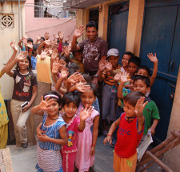India (MNN) ― Disruptive violence against evangelists, pastors, and church gatherings continues to occur on a monthly basis in India, usually where the Christians live and work in remote or rural areas.
Mainly, the troublemakers are organized by extremist Hindu organizations who believe that those belonging to other faiths have no place in India and should be forced to leave.
According to Open Doors, it is likely that there's a higher degree of persecution because of the success Christianity is having among the low castes and untouchables, or Dalits. It means a loss of influence and power to Hindu leaders.
With the likelihood of rising oppression, Dave Stravers with Grand Rapids, Michigan-based Mission India asks, "How do you engage in this battle in a way that will break down the barriers and enable people to understand what Jesus can mean for their life?"
India's secularism may be critical to answering that question. Stravers explains that "India has never been more open to the Gospel than now. The growth of churches has really stirred up some of these activists. We have a ministry in India that's doing this in a really effective way, and it seems to completely disarm the opponents."
Their strategy is unusual, Stravers admits. "How can you use children to fight a spiritual battle? That's the question." That's especially important when you consider that for the average family helped by Mission India, grinding poverty is a major problem. 40% of India's population under five is malnourished; a staggering 72% of Indian children never attend high school, and there are 60 million child laborers.
You start with education. Mission India has Bible Clubs and many other programs that build on relationship in the community. "There are literally tens of thousands of Christian volunteers that want to do this. They go every day, two hours a day, and they get this relationship with the kids and then with their parents. We have many converts, and in most cases, we end up with a new church."
Teachers that run the clubs are trained from the local churches. Mission India provides all of the materials and training. Stravers says they're not shy about who they are and what they're about. Even so, "Hindu and Muslim parents are very willing for their children to attend these clubs because they know Christians have a reputation for education, and they know their kids need this kind of help if they're going to succeed in school."
So, when word gets out that a club is starting, there's immediately a throng of eager participants. "Children come after school to meet in a location. A Christian teacher from some nearby church tutors them in their lessons, leads them in some games, tells Bible stories, helps with learning memory verses, and sings songs." Most of these kids take their new material home, sing the songs, and otherwise live out the lessons they're learning. On more than one occasion, says Stravers, that has resulted in the parents coming to Christ, too.
Even though Christians are bracing for increasing persecution in the future, that's having very little effect on the zeal following this program. "The demand is four or five times what we can provide. It only costs a dollar to bring a child through one of our 10-Day Clubs." Stravers goes on to say they have to turn away thousands of churches for lack of funding, which supports training and resourcing.
However, their teams can't afford to stop. A future body of Christ hangs in the balance. "India has 350 million children under the age of 14, more than the entire population of the United States. The remarkable thing is that it's the Hindu children and the Muslim children who are the most eager to participate."
Learn more on our homepage in the Featured Links Section.

No comments:
Post a Comment